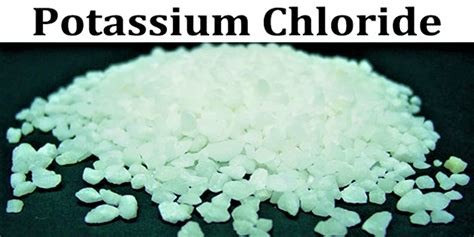Intro
Discover the potential risks of potassium chloride supplements. Learn about 7 potassium chloride side effects to watch out for, including cardiac arrest, muscle weakness, and gastrointestinal issues. Understand the dangers of excessive potassium intake and how to use this essential mineral safely, minimizing the risk of adverse reactions and interactions.
Potassium chloride, also known as KCl, is a naturally occurring mineral that is essential for various bodily functions, including maintaining a healthy heart rhythm, regulating blood pressure, and supporting muscle function. While potassium chloride is generally considered safe, excessive consumption or certain medical conditions can lead to adverse effects. In this article, we will discuss seven potential potassium chloride side effects to watch out for.
What is Potassium Chloride?
Potassium chloride is a crystalline mineral composed of potassium and chlorine ions. It is commonly found in foods, such as bananas, leafy greens, and nuts, and is also available as a dietary supplement. Potassium chloride is often used to treat potassium deficiency, also known as hypokalemia, which can occur due to various factors, including medication, kidney disease, or excessive sweating.
Potassium Chloride Side Effects: What to Watch Out For
While potassium chloride is generally well-tolerated, high doses or prolonged use can lead to adverse effects. Here are seven potential potassium chloride side effects to be aware of:

1. Gastrointestinal Upset
One of the most common potassium chloride side effects is gastrointestinal upset, including nausea, vomiting, diarrhea, and stomach cramps. This is often due to the high chloride content, which can irritate the digestive tract.
2. Abnormal Heart Rhythms
Potassium chloride can affect heart function, particularly in individuals with pre-existing heart conditions. High doses can lead to abnormal heart rhythms, including arrhythmias, bradycardia, or tachycardia.
3. Muscle Weakness and Fatigue
Potassium chloride is essential for muscle function, but excessive intake can lead to muscle weakness, fatigue, and cramps. This is often due to an imbalance of potassium and other electrolytes.
4. Respiratory Problems
In rare cases, potassium chloride can cause respiratory problems, including shortness of breath, wheezing, and coughing. This is often due to an allergic reaction or an underlying respiratory condition.
5. Skin Irritation
Potassium chloride can cause skin irritation, including redness, itching, and rashes, particularly when applied topically.
6. Interactions with Medications
Potassium chloride can interact with certain medications, including diuretics, ACE inhibitors, and beta blockers, which can increase the risk of adverse effects.
7. Overload and Toxicity
In rare cases, potassium chloride can lead to potassium overload, also known as hyperkalemia, which can be life-threatening. Symptoms include muscle weakness, fatigue, and abnormal heart rhythms.
Preventing Potassium Chloride Side Effects
To minimize the risk of potassium chloride side effects, it is essential to:
- Consult with a healthcare professional before taking potassium chloride supplements.
- Follow the recommended dosage and duration of treatment.
- Monitor potassium levels and adjust the dosage as needed.
- Avoid taking potassium chloride with other medications that can interact with it.
Conclusion
While potassium chloride is generally safe, excessive consumption or certain medical conditions can lead to adverse effects. By being aware of the potential potassium chloride side effects and taking steps to prevent them, individuals can minimize the risk of complications and ensure safe and effective treatment.
Frequently Asked Questions
What is the recommended dosage of potassium chloride?
+The recommended dosage of potassium chloride varies depending on the individual's needs and medical condition. Typically, the dosage ranges from 1.5 to 3 grams per day.
Can I take potassium chloride with other medications?
+No, it is not recommended to take potassium chloride with other medications without consulting a healthcare professional. Potassium chloride can interact with certain medications, increasing the risk of adverse effects.
What are the symptoms of potassium overload?
+Symptoms of potassium overload, also known as hyperkalemia, include muscle weakness, fatigue, and abnormal heart rhythms.
